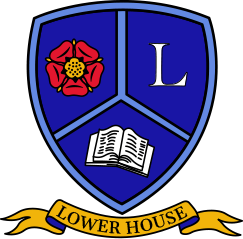Maths
Maths Co-ordinator: Mrs G Wallace
At Lowerhouse Junior School, we inspire in our ‘mathematicians’ a sense of curiosity about the number, patterns, systems and calculations, which will remain with them for the rest of their lives. We believe Maths should be taught through the Mastery approach, that all pupils “can do” maths, and reject the idea that some “just can’t do it”.
Intent
Mathematic Aims:
- Mathematics teaching for mastery at Lowerhouse Junior School, assumes everyone can learn and enjoy mathematics.
- Learning behaviours are developed such that pupils focus and engage fully as learners who reason and seek to make connections.
- Teachers continually develop their specialist knowledge for teaching mathematics, working collaboratively to refine and improve their teaching.
- Curriculum design ensures a coherent and detailed sequence of essential content to support sustained progression over time.
At Lowerhouse Junior School, we use RED ROSE MATHS as our framework for teaching maths. The scheme provides teachers with comprehensive planning materials for each lesson including teaching resources, detailed planning guidance and children’s task sheets, including deeper learning tasks to challenge more able mathematicians
Through Red Rose Maths:
- Pupils are taught through whole-class interactive teaching, enabling all to master the concepts necessary for the next part of the curriculum sequence.
- In a typical lesson, the teacher leads back and forth interaction, including questioning, short tasks, explanation, demonstration, and discussion, enabling pupils to think, reason and apply their knowledge to solve problems.
- Use of precise mathematical language enables all pupils to communicate their reasoning and thinking effectively.
- If a pupil fails to grasp a concept or procedure, this is identified quickly, and gaps in understanding are addressed systematically to prevent them falling behind.
- Significant time is spent developing deep understanding of the key ideas that are needed to underpin future learning.
- Key number facts are learnt to automaticity, and other key mathematical facts are learned deeply and practised regularly, to avoid cognitive overload in working memory and enable pupils to focus on new learning.
We deliver a curriculum that shows:
- representation and structure - effective pedagogies for modelling, concrete-pictorial-abstract approaches, effective use of manipulatives and transition between them.
- coherence - curriculum design, progression of objectives, sequencing learning, small steps, contextualising learning between different areas of mathematics.
- mathematical thinking - effective questioning, identifying patterns and relationships, deep understanding through reasoning and problem solving, supporting children to achieve
deeper learning where appropriate. - variation - progression through representations using conceptual variation, progression through questioning using procedural variation.
- Fluency - efficiency, accuracy, flexibility, developing unconscious competence.
At Lowerhouse Junior School we continue to promote all aiming high, whilst developing expectation that all children will achieve in Maths. Through adaptive teaching we tailor the learning in Maths to meet the needs of all our pupils; with our ‘challenge for all’ approach every learner meets the learning intentions. We are all mathematicians!
Implementation
At Lowerhouse Junior School, planning for Maths is a process in which all teachers are involved to ensure that the school gives full, consistent coverage of the primary mathematic concepts an mathematical thinking. Maths teaching in our school is driven by key concepts.
Format of the lesson:
Each maths lesson will demonstrate a carefully sequenced journey through the learning (guided learning then independent tasks followed by deeper learning activities for those pupils who grasp the concept well), which is led by the teacher and presented to most children. Some pupils will have the lesson adapted to meet their individual needs. Careful questioning, short tasks, explanation, demonstration and discussion will all be evident. Lesson design links to prior learning, ensuring all can access the new learning and identifies carefully sequenced steps in progression to build secure understanding. Examples, representations and models are carefully selected to expose the structure of mathematical concepts and emphasise connections, enabling pupils to develop a deep knowledge of mathematics. Procedural fluency and conceptual understanding are developed in tandem because each supports the development of the other. It is recognised that practice is a vital part of learning, but the practice must be designed to both reinforce pupils’ procedural fluency and develop their conceptual understanding.
Key Principles in our implementation of maths:
- Using the key vocabulary - children replicating the correct use.
- Encourage deeper thinking - reinforce, don't rush key concepts.
- There are scaffolds to support children - challenge for all through extension questions and an explanation of possible misconceptions.
- Children understanding and enjoying Maths - having the resilience to accept challenge and to question their understanding
- Assessment for Learning is crucial - building on prior knowledge, using pre teaching and teachers adapting as the children learn.
Learning Checks are used to guide the learning taking place
Impact
At Lowerhouse Junior School, we use both summative and formative assessment to assess the impact of our Maths curriculum. The below approaches to assessments are examples of what teachers and leaders use to determine the progress and attainment of Lowerhouse Junior School’s mathematician.
- Formal, informal and verbal feedback - live marking
- 3 formal internal data drops
- Moderation of work - internal and external
- Tracking against National curriculum objectives
- Pupil Voice
Report to parents
